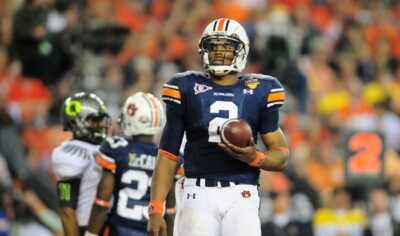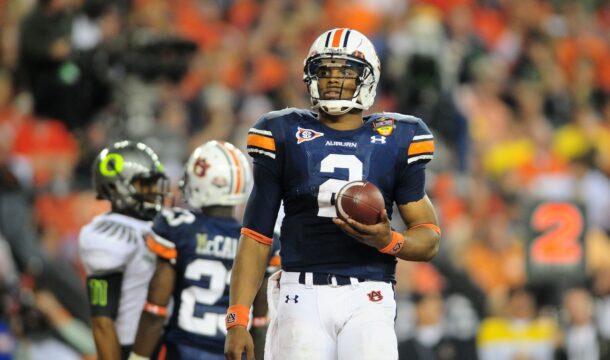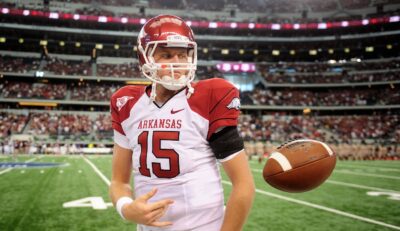
Florida put the pads on for the first time in fall camp, and perhaps bored with the coach-speak that usually follows these early summer practices, an interesting debate broke out on Twitter about who would be on the “Mount Rushmore” of best players to ever put the pads on at Florida.
https://twitter.com/UFBarstool/status/1026581733775425541
It’s an interesting debate, and one that got me thinking about another fascinating debate suitable for the slow-news day fodder that accompanies the first spring practices.
Who should follow Tim Tebow into the Ring of Honor at Florida?
The Ring of Honor looms over The Swamp and is an indelible reminder of the program’s excellence, particularly over the past half-century, and Tebow’s inclusion was always only a matter of time. The Heisman winning quarterback will be inducted this season when the Gators host LSU. If you want to hear The Swamp aircraft-carrier loud, I’d encourage you to make your way to Gainesville on Oct. 6.
Tebow will be the sixth person in the 112-year history of Florida football inducted into the Ring of Honor, joining fellow Heisman winners Danny Wuerffel and Steve Spurrier (who also qualified as a coach), NFL Hall-of-Famers Jack Youngblood and Emmitt Smith, and 1983 National Defensive Player of the Year and two-time consensus first-team All-American Wilbur Marshall.
But who comes after Tebow?

I found myself thinking about this question while spending a lazy Sunday watching (too much of) the “Gators Takeover” of the SEC Network, which included a broadcast of the Florida’s 2008 BCS National Championship victory over Oklahoma.
First, let’s look at the criteria for entry.
According to the University of Florida Athletic Association, to qualify for the Ring of Honor, a person must meet one or more of the following criteria:
- Win the Heisman Trophy (Spurrier, Wuerffel, Tebow)
- UF All-American inducted into the NFL Hall of Fame for professional accomplishments (Youngblood, Emmitt Smith)
- UF All-American who is an NFL Career Category Leader (Emmitt Smith, rushing)
- Collegiate Career Category Leader
- UF Coach who wins National Championship (Spurrier, Meyer*)
- Coaches with at least 3 SEC Championships (Spurrier)
- Players with 2 or more consensus All-American Selections (AP, Walter Camp, Sporting News, AFCA, FWAA, ABC, UPI) who have also been named National Offensive/Defensive Players of the Year (Wilbur Marshall)
- The Individual must be five years removed from playing at Florida and also be in good standing with the University
Under these criteria, many have correctly pointed out that technically, the next eligible person who could be inducted into the Ring of Honor is Urban Meyer, who qualifies as the coach of two National Championship teams.
Given the final requirement of “good standing” with the University and the acrimonious way Meyer left Florida, the debate about whether Meyer’s induction will ever occur was already a complicated one even before the revelations of the last week regarding Meyer’s lying and mishandling of the repeated-domestic abuse allegations against former Florida and Ohio State assistant coach Zach Smith.
If not Urban, who?
Eventually, Maurkice Pouncey will qualify, when he retires from football and is eventually and inevitably inducted into the NFL Hall of Fame. Should former defensive end Kevin Carter, offensive tackle Lomas Brown or longtime Jaguars star Fred Taylor find their way into Canton, as many argue they should, they too would qualify for the Ring of Honor. Beyond those four names, it’s difficult to say who would meet the criterion, as presently constituted.
All four of those names are Gator greats, but none is the best option.
That option was overwhelmingly clear watching the replay of Florida-Oklahoma.
There’s only one name, and it’s Percy Harvin, the dynamic all-purpose wide receiver who was, along with Tebow, the key cog in the Mullen/Meyer offensive machine that led the nation in offense in 2007 and 2008 and won two national championships in Harvin’s three seasons on campus.
If the 2008 SEC Championship victory over No. 1 Alabama, played without an injured Percy Harvin, was Tim Tebow’s finest hour, the BCS National Championship was Harvin’s.
Harvin’s two explosive runs, both with the Gators behind schedule and in poor field position, changed the tenor of a nip and tuck football game. The second, in a tight game in the fourth quarter, set up the winning field goal. That Harvin did it playing with a fractured bone in his foot, limiting his second-level speed and making even walking outside his tightly-wrapped cleats difficult, was a testament to Harvin’s grit and greatness. On the evening, Harvin finished with 170 total yards on only 14 touches, along with a go-ahead touchdown on a time-consuming battering ram of a Florida drive in the third quarter.
Tebow was named the game’s MVP, and on a surface level, that was a reasonable assessment of the football game, especially given Tebow’s prominent role on both of Florida’s second-half touchdown drives. But as was often the case in Harvin’s career at Florida, when the Gators backs were against the wall, Meyer and Mullen turned to No. 1, who delivered the goods time and time again. In fact, when Harvin, on one good leg, blasted through for 52 yards in the fourth quarter, the announcers were literally discussing how Oklahoma had all the momentum.
That’s just who Percy was as a player.
A coveted recruit out of Virginia, Harvin was impactful from the moment he set foot on campus. Harvin led the team in rushing in his first game as a freshman and led the team in receiving a week later. He torched Florida State for a 42-yard touchdown in a tight win at Doak Campbell Stadium, and a week later, wearing a neck brace after suffering a late hit vs. FSU, he collected 167 yards and scored two touchdowns on eleven touches in Florida’s SEC Championship win over Arkansas.
His final score, a 67 yard-touchdown fourth-quarter touchdown run with the game very much in the balance, saw Harvin make the one explosive cut that made him so dangerous and dart off untouched, into the Atlanta night. Mick Hubert’s call, which featured the legendary Gator announcer proclaiming, “You won’t catch him” to an Arkansas defensive back in hopeless pursuit, also coined the phrase “Mercy Percy!” which is now part of Gator lore.
For that performance, became only the second freshman named SEC Championship Game MVP. In the BCS Championship rout of Ohio State, Harvin added 82 total yards and a touchdown. He was named a Freshman All-American and the SEC’s Freshmen of the Year his first season on campus.
Harvin was also excellent as a sophomore, collecting over 1,500 total yards rushing and receiving and scoring 10 touchdowns. He was at his best in Florida’s losses — when the Gators needed him most. He had 150 yards on just 12 touches against Georgia, keeping Florida in the game throughout, and shredded Michigan for 242 total yards and two touchdowns in a tight Capital One Bowl defeat. He finished the year first in the SEC in yards per rushing attempt, earning First-Team All-SEC and consensus All-American honors, accolades that earned him a spot on every preseason All-American team heading into 2008.
Needless to say, Harvin lived up to the hype as a junior. He earned consensus first team All-American honors, averaging a staggering 12 yards a touch (the highest number in the SEC this century for a player with over 100 touches) and scored 17 touchdowns, an absurd average of almost 1.7 every 10 touches. He missed the SEC Championship game but put a bow on a marvelous career with a performance that in almost any other year would have (and should have) earned him BCS Championship Game MVP Honors.
So why not Harvin?
Herein lies the rub.
Under the strict rules of the Ring of Honor, he doesn’t qualify.
That’s ridiculous.
Harvin is a generationally great college football player — not just by Florida standards — but by SEC standards.
If the Ring of Honor rules exclude him, aren’t they a little too demanding?
Here’s the resume. Harvin was twice an All-American, but only once a “consensus” All-American. He was a key piece of two national championships, twice first-team All-SEC, captured a SEC Championship game MVP and should have been a BCS Championship MVP, but under the strict rules, that isn’t good enough because he was never named “National Offensive Player of the Year” (a feat that’s basically impossible for anyone at his position).
Without Harvin, Florida probably doesn’t win two national championships under Meyer. He was that impactful.

Most important, Harvin is, after all these years and many ups and downs, on good standing with the University of Florida, where, as documented in this wonderful piece at SI by Michael McKnight, he is back in Mullen’s inner circle and enrolled in school. Living in Gainesville, raising his son and hoping to get into coaching, Harvin appears content, focused, at peace.
It’s hard to think of a better gesture of goodwill toward a player who has already given and hopes to give UF so much more than to alter the rules for the Ring of Honor to accommodate his prodigious talent?
If there were a Mount Rushmore of Florida’s greatest four players ever, Harvin would arguably be on it.
Shouldn’t he be on the Ring of Honor too?
Neil Blackmon covers Florida football and the SEC for SaturdayDownSouth.com. An attorney, he is also a member of the Football and Basketball Writers Associations of America. He also coaches basketball.







